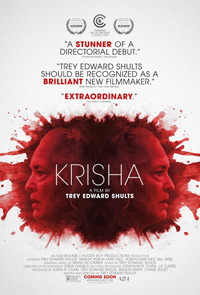Turkey Shoot: Shults Brings Heartache to the Holidays in Intimate Debut
We’ve seen it plenty of times before, the hellacious discomfort accompanying the enforced tradition of less than ideal holiday get togethers, especially when they include strained reunions with hostile family members. Trey Edwards Shults does just that, but to overall commendable effect with homespun Krisha, an award winning feature version of his earlier celebrated short from 2014. Taking home the Grand Jury and Audience award at the 2015 SXSW Film Festival prior to stopping off at Cannes Critics’ Week and AFI Film Festival, the film has become a critical darling on the festival circuit and features an emotionally authentic portrait of discord featuring a breakout performance for lead actress Krisha Fairchild.
Krisha (Fairchild) has been estranged from her immediate family for ten years, a fact we gather quickly as she arrives at her sister Robyn’s (Robyn Fairchild) to attend Thanksgiving dinner. Forced pleasantries abound as Krisha makes the rounds, some more noteworthy than others, as when she greets her ailing mother (Billie Fairchild). It’s apparent this is Krisha’s tentative reintroduction to the family following a barely acknowledged past life speckled with emotional issues and a hard-won battle over alcohol addiction. Vials of pills are required to keep her in check, and there’s a flighty anxiousness about her which puts even the most welcoming distant relative on edge. She has good reason as her desperate goal is to prove to her son (Trey Edward Shults) she has been rehabilitated enough to begin a meaningful relationship. But when it’s obvious Thanksgiving is neither the time nor the place to untuck a legion of emotional baggage, Krisha begins to come undone.
Shults’s style draws obvious comparison to indie godfather John Cassavetes, partially due to Krisha’s frenetic yet perpetually contained dramatics (the film was shot in just a little over a week) which lends it a rare, snappy liveliness. Moreso, Fairchild’s titular performance and its similarities to Gena Rowland’s famed unraveling in the arduous A Woman Under the Influence (1974). But Shults is less attenuated with the supporting performers outside his galvanizing lead, unlike Cassavetes, and whenever Fairchild isn’t the focal point (which isn’t often), the energy dissipates. Krisha is very much a familial affair, which perhaps accounts for the filmmaker’s efficiency with the feature, shot in his parents’ home, starring his mom, and grandma, while Fairchild is his aunt.
DP Drew Daniels, who also lensed the short version of the film, creates a particular emotional distress with his frames, adding to the anxiety and the inevitable outburst we have been anticipating. Languorous shots through the family home, paired with Brian McOmber’s pronounced score of queasy strings, creates an otherworldly spiritual presence. Considerable pains were taken with the sound design, and if one weren’t the wiser, it’d be easy to assume Schults was readying us for a curveball into outright horror. We capture Krisha at odd, sometimes unflattering angles, as if the ghosts of the past are actually floating all around her, unseen, but amplifying the palpable stress of unresolved histories.
While we’re on edge watching Krisha uneasily engage with her unconvinced sister, several moments with her son and his simmering anguish create severe agitation, and are, of course, what spur an eventual relapse. Around her is a sometimes crushing noise, as if everyone and everything else is engaged or stimulated by something while she is the deadening eye of the storm. Fairchild elicits a profound sympathy in this complex portrayal—we’ve seen plenty of cinematic incarnations of similar characters, but she gives a marvelously compelling performance, which stands beside and apart from her more notable comparisons.
In its most profound moments, the film aligns Krisha with the plumped up turkey, being readied for a devouring ritual between humans socially assigned to consume each other via proposed familial hierarchies. With his Krisha projects and two prior shorts (Mother and Son, 2010; Two to One, 2011), all featuring Fairchild, Schults seems consumed by depictions of humans forced to engage with insurmountable grief. With his feature, this director and actor achieve a masterful portrait of imploding obligations.
★★★/☆☆☆☆☆



